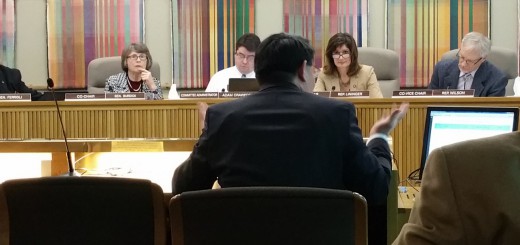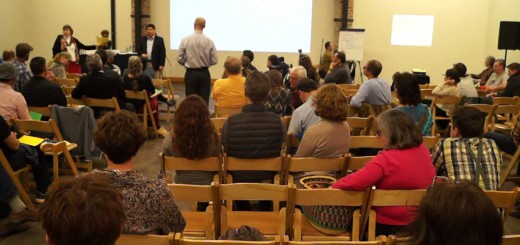Thursday, June 18, 2015 was the first early morning meeting for the M91 Committee. Co-Chair Lininger first clarified a few misconceptions:
1. Those who were concerned that the opt-out might provide a “slippery slope” on other issues should understand that the distinction for this issue is that it is federally illegal still and that the committee was hoping to avoid local communities seeking injunctions to halt implementation based on concerns that they would be required to issue licenses or authorize conduct that is illegal under federal law.
2. Local communities that opt-out of any category of license are prevented from taking the 3% local tax and are also subject to the restrictions on revenue distribution originally found in Measure 91 as well.
3. Concerns surrounding access are somewhat addressed by introducing a strong grandfather clause, even in communities that opt-out and she noted that “very significantly”, communities cannot opt-out of medical grows or caregivers. She said while not everyone was pleased with this, it was a practical and appropriate outcome.
She also noted that we are approaching the end of the session, but that there are a number of good ideas that may not be able to be passed this session but could continue to be worked on for the short session in 2016.
Senator Edwards testified first about the amendment he was proposing, the dash 36 amendment for SB 844. He noted that this language originated in SB 480-1, and it creates the task force for medical research but now is expanded to include public safety research as well. He said that this task force will be used to advise on potential legislation in the future.\
Co-Chair Burdick noted that the dash 36 was a better bill then originally proposed and that she was happy with the final product. Sen. Prozanski questioned whether the task force was legislative driven or agency driven. Sen. Edwards said that they will report to the legislature and that OHA would staff the task force.
The public hearing for HB 2041 was opened with Lininger noting that there were three bills left to use as vehicles for dealing with the marijuana issues this session. She explained that SB 844 was intended to deal with the task force, expungement issues potentially and that the early start and some technical fixes may also end up there. She noted that HB 2041 is the taxation at the point of sale and clarification on prohibiting jurisdictions that opt-out from collecting tax revenues under M91. She said that HB 2040 would potentially end up with tax elements of the early start, if that were adopted. Burdick noted that the whole tax element could end up in 2041.
Mazen Malik returned to discuss the questions related to how the point of sale tax proposed compares to the original tax revenue estimates for M91. He noted that the 17% tax would actually increase revenue by about 10 million dollars after the first year, despite reducing the final cost to consumers. He explained that the originally proposed tax at the producer level was multiplied through markups, resulting in a greater price to consumers at the end. The original revenue estimates anticipated $300 per ounce, while the new estimates anticipated about $277 per ounce instead. He noted that the revenue cold be as low as 24 million and as high as 35 million per base year. He also noted that 2017 would have reduced revenues since there would be start up costs and difficulties with initial implementation, so he calculated the revenue to be about 38% (about $10.7 million) of what it would be in later years.
He pointed to the original revenue estimates, on page 14, and said that this is where you could compare this new estimate with those estimates for a one-to-one comparison. Burdick questioned if the revenue anticipated under the proposed language would raise the amount of money voters were expecting when they passed Measure 91, and Mazen pointed out that it would actually be about $10 million more than anticipated due to the various factors he identified.
Co-Chair Lininger questioned how Mazen’s estimate compares to other estimates provided by EconNorthwest or others. Mazen explained that while those were not based on the same expert taxation perspective, but even still, if they looked at this new language, their estimates would likely rise by similar amounts.
Sen. Prozanski urged placing the early start language in SB 844, and foregoing the tax until the means were in place to collect it at a later time. Burdick noted that she felt that the early start should go into HB 2040 and that she would talk to Prozanski offline. Lininger pointed out that the taxation issue couldn’t start in the Senate, so it either needed to be bifurcated or starting in the House.
Dennis Morgan or the Oregon Environmental Laboratory Association testified that there was some confusion on who was doing what with the lab accreditation. He also noted that it would be helpful if ODA created Special Local Needs (SLN) licenses for pesticide use under FIFRA, so that labs would know what to test for to make it more cost effective.
Sam Chapman testified that seeds should be included in early recreational sales, and that he supported early sales in general. He noted that the 130 dispensaries located in the Portland region were struggling to stay open and early start would give them a legup on the issue.
Donald Morse of the Oregon Cannabis Business Council also testified in support of early start and said that while they were concerned with the July 1 date being only a few weeks away, they were supportive of getting the early start in place as soon as possible. He also suggested provisions of language that came from the Patients’ Bill of Rights that he wanted to see included:
HB 2821 Sec 6 which prohibited doctors from refusing to prescribe medications to medical marijuana patients.
HB 2821 page 2, line 26-30 which allows hospice patients to have their medicine administered by people other than their designated caregiver.
Also lifetime card for chronic or terminal diseases. He noted that there was no reason for patients to have to jump through hoops to recertify their illness if it wasn’t ever going away, such as glaucoma or phantom pain syndrome for an amputed limb.
Geoff Sugarman expressed support for the research task force, and his support for early sales, although with the tax remaining the same as it would be under retail sales. He opposed the provision in the bill that required recording the name of purchasers for retail sales, and felt it was more important to track sales not people. He noted that Vancouver Washington stores were seeing 50% Oregonians purchasing product, and that Oregon should take advantage of that market now. Matt Walstadder and Meghan Walstadder joined him in supporting the early start to empower local businesses to compete and that Oregon had sufficient supply to meet that increased demand.
Casey Houlahan from the Oregon Retailers Cannabis Association also testified in support of early sales, and suggested that the dash 3 to HB 2040 was the preferred model. David McNichol of Dave’s Space Cakes also supported the early start on July 1.
Beau Whitney of Greenpoint Oregon proposed two amendments to SB 844. The first related to the date for opt-ing, suggesting it should be based on when the application was submitted to the OLCC. The second was including CO2 extracts in limited marijuana items available for early sales.
Kimberly McCullough of the ACLU testified that she also felt it was intrusive to collect names of purchasers and would scare people away due to privacy concerns. She expressed support for the issues brought up by Don Morse regarding the Patients’ Bill of Rights. She also noted a concern relating to the language surrounding crimes that occurred in conjunction with marijuana crimes, noting that the language currently would pick up completely unrelated crimes, potentially years apart, and that she doesn’t believe that was intended.
Lucas Littlefield of MX Biotech testified on support for the dash 36 amendments on research. Pete Kramer testified that it was important for the public to get safe access much like patients have.
Prozanski reiterated his concern that the early sales should take place July 1, and that taxes could come online when the state was equipped to collect them. He also agreed with Sam Chapman that seeds should be available for sale through the early start. He noted that names should not be retained for early sales and that the cities and counties that opt-out should not be able to collect any tax revenues under M91.
Sen. Ferrioli agreed with the July 1 early start without taxation. He also agreed that names should not be retained, and said that the Cole Memo only calls for tracking revenue not individuals.
Co-Chair Burdick concluded the meeting by noting that the session was nearly over so the meeting on Tuesday could be quite busy.






